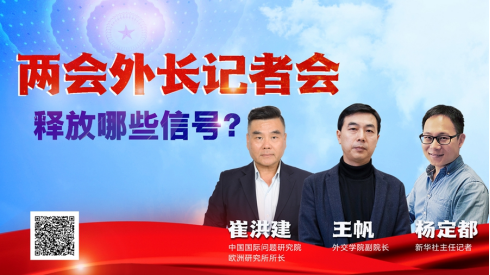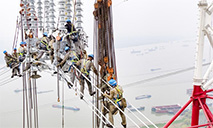What does Foreign Minister's Press Conference at this year's Two Sessions signal?

(Source: Xinhua)
Xinhuanet, Beijing, March 10: Amid the increasingly turbulent and complex state of global affairs, the press conference with the Chinese Foreign Minister Wang Yi under the limelight at this year's Two Sessions, which took place a few days ago, has attracted tremendous attention both at home and abroad. In an exclusive interview with Yang Dingdu, reporter of Xinhuanet, Vice President of China Foreign Affairs University Wang Fan and Director of the China Institute of International Studies' Department for European StudiesCui Hongjian have interpreted the important signals sent at this press conference. The following is an edited transcript of the interview.
Reporter: First of all, please tell us your overall impressions on the press conference attended by the Chinese Foreign Minister Wang Yi at this year’s Two Sessions.
Wang Fan: At the foreign minister’s press conference, China firstly has exuded full confidence. This is because the just-concluded Beijing 2022 Winter Olympic Games has proved that China, as the host nation, is capable of teaming up with other nations to put on a splendid, simple and safe grand gathering, in spite of many difficulties China faces.Throughout this whole process, we also observed most of the world's peoples' commitment to unity, as well as their willingness to cooperate. Foreign Minister Wang, who is a State Councilor, has specifically mentioned that China has demonstrated unity during the whole process of the Winter Olympics. It is this unified atmosphere that gives us the confidence to face the future.
Secondly, China has showed its responsibility as a bigmajor country. China is now playing an increasingly important role, shouldering whatever responsibilities it can as well as acting in a proactive and constructive manner when it comes to matters of great importance, such as the Russia-Ukraine conflict and the nuclear issue on the Korean Peninsula.
Moreover, China has called on other big nations to shoulder the necessary responsibilities to maintain world peace and safety. This is because, the problems we are facing in the current context — such as non-traditional security concerns — cannot be resolved by any one nation alone. They require the equal cooperation of all big major countries.
Reporters: In response to a Reuters journalist's pointed line of questioning regarding the state of affairs in Ukraine,Wang Yi responded that [China] will make "its own independent judgements on the merits of the matter". How can we interpret this statement?
Cui Hongjian: At the press conference, Western media outlets' questions regarding the Russia-Ukraine conflict were not only pointed, but very tricky. This Reuters journalist's line of questioning was particularly representative of Western public opinion at the time. Their central ideas were twofold: first, they called into question whether China's attitude toward the conflict is one of upholding loyalties rather than ethics — in other words, whether we side with Russia merely because of our close ties, and whether these ties make us incapable of having an independent stance. Second, they questioned if China should do more and be more proactive, if only for the purposes of maintaining our status and role as a great power. These two questions laid a number of traps, yet I felt Wang was cool and level-headed in his response, which centered on our nation's stance. Not only did he avoid falling into these rhetorical traps — he explained what it is that we truly want and what we are doing, one thing after another.
Truthfully, when it comes to the Russia-Ukraine conflict, China has an extremely clear opinion, which Wang Yi has expressed before on a number of occasions. But I felt that, at this press conference, when addressing the international community, Wang went even further in his explanation than before. Though he thoroughly expressed China's stance, merely discussing principles and stances is not enough — particularly when it comes to China, considering that the international community's expectations toward us are rising.
By delving into the "merits of the matter", Wang made China's stance even more explicit. His response was extremely systematic, comprising of "four obligations", which are interconnected and form an organic whole and addressing all concerns.
We must also pay attention to resolving certain issues of the current Russia-Ukraine conflict, such as avoiding a humanitarian crisis and reducing civilian deaths. Wang specifically mentioned the need to resolve major humanitarian crisis. I think this shows that, when it comes to dealing with international relations, China not only focuses on ties between nations, but also considers things from the perspective of civilians, because of our concept of a "community with a shared future for mankind". This is a manifestation of the Chinese Communist Party's implementation of people-based governance within the field of foreign diplomacy: our stances revolve around the international community and the common people of all nations.
Finally, when it comes to planning ahead, if we merely address the symptoms of global issues rather than their root causes, then incidents like the Russia-Ukraine conflict are likely to occur again in the future. This is also to say that Europe must develop a sustainable security framework according to long-term goals and in keeping with the principle of the region’s inseparability. This is China's thorough viewpoint that takes into consideration both present and future. It is our extremely clear independent stance, based on our judgement of the facts of the current situation.
Reporter: Wang mentioned that resolving complex issues requires a cool and rational approach if we are to avoid needlessly exacerbating conflicts. And yet, currently, the West — including NATO — are indeed pouring fuel on the flames. What did the West actually do to address the continually escalating the Ukraine crisis?
Wang Fan: We must first address the matter of responsibility. In fact, China has already shouldered our responsibilities in this matter as well as maintaining an impartial, accurate assessment of the facts, upon which we have worked out a number of solutions. At the same time, we are also aware of the extremely complex context behind these problems. They are caused by multiple factors and are not the sole responsibility of any one nation. Simply imposing sanctions or blaming on any one nation will not effectively resolve the problems, rather they require everyone to cooperate and meet each other halfway.
However, we've seen that certain countries are the originators of the Ukraine crisis. They have had a hand in instigating the crisis and have proactively contributed to making it worse. Some even planned it behind the scenes. Their goal is not to resolve problems, on the contrary, they intend to perpetuate them and even make them spread. As the crisis is continually worsening, they have donated weapons and ammunition to one side of the conflict. This is a typical way of pouring fuel on the flame.
We also know that sanctions against Russia will have a negative impact on the entire international community, including Europe. In the long run, they may also be detrimental to the United States and the US dollar system. Worse still, such sanctions will further exacerbate conflicts. So, the contradiction between Russia and Western powers will not be solved by imposing sanctions, but will be made worse, triggering a chain of negative consequences.
Therefore, Wang specified that the more tension there is or the more differences there are, the more negotiations are necessary. What Wang meant are we must exercise rationality and restraint in regard to the problems. What kind of measures can help alleviate the problems? Russia and Ukraine holding multiple rounds of talks in order to reach an initial agreement regarding opening humanitarian corridors is an extremely promising starting point. In this regard, China has also contributed Chinese wisdom and Chinese plans. I think that Wang's mentioning of these plans is a good demonstration of how we are promoting negotiations and how we are pushing things to develop in a positive direction. This includes maintaining the rapidity, promptness, effectiveness and security of humanitarian corridors under the UN framework, as well as fundamentally ensuring the safety and protecting the lives of both Ukrainian and foreign civilians. I feel that addressing these concerns will truly put us on the right track to resolving the crisis.
Reporter: Wang said that the ties between China and Russia are founded on the values of autonomy and independence — that they are built on the premise of not forming an alliance, not opposing one another, and not ganging up on other nations. More importantly, they are not influenced by any third parties. Could you elaborate on Wang's stance?
Cui Hongjian: The China-Russia relations are one of the most important bilateral ties in the current global state of affairs, and The China-Russia comprehensive strategic partnership of coordination has made sound achievements over the years. In light of current Russia-Ukraine conflict, more attention are being paid to the Chinese-Russian relations. Wang initially re-emphasized several principles of the Chinese-Russian relations, such as non-alliance. This effectively responded to certain concerns held by the international community, Western nations in particular. Because, there is a viewpoint in the West to the effect that China has tacitly consented to or even supported Russia's actions in the Russia-Ukraine conflict, which has then served as the basis for allegations that China and Russia have formed a kind of alliance. However, Wang emphasized China's stance of not forming an alliance, as well as the reasons behind this stance. Wang saidthat it isnot China's own desire, it is a mutual consensus between China and Russia. Cooperating without forming an alliance is one of the true implications of the strategic partnership between the two countries.
Of course, I also understand that Western countries have, throughout the history of international relations, often found themselves either in a state of alliance or opposition. This reductive, dualistic mode of relations has limited their perception. However, over the years, including during the Russia-Ukraine conflict, China has always adheredto the principles of the UN Charter, while maintaining a close cooperative partnership with Russia. This is patently clear. When developing ties with a nation, China doesn’t sully the relations with selfish motives or have its own interests. China acts in the shared interests of the two peoples and promotes cooperation in all areas with the ultimate goal of helping the development of the two countries and improving the living standards of the two peoples.
At the same time, the cooperation between China and Russia also serves the purpose of maintaining regional stability. For instance, the Shanghai Cooperation Organization has made great contributions to this end. It needs to be re-emphasized that our relations do not target other nations, nor should they be interfered with by other nations. This is an extremely important point. Wang mentioned later on in his response that the development of Chinese-Russian relations has a very powerful internal driving force. We know that, if such internal driving forces arenot handled properly, then countries can find themselves in a state of "maintaining ties for the sake of it". For instance, certain countries in the West have often adopted an opportunistic approach to international relations — taking advantage of their allies for as long as needed, and abandoning them the moment they're no longer of use. However, if Chinese-Russian relations have maintained a degree of stability, it's precisely because of this powerful internal driving force. This force results not only from the fact that we're two neighbouring powers — it's also because of the mutual benefits we've derived from our collaborations in fields such as energy and trade.
Thanks to this internal driving force, our relations aren't subject to the influence of a third party. Tensions between the US and Russia aren't going to give us any ideas, or affect our relations with Russia. This is the right way for a great power to approach foreign diplomacy.
Reporter: What kind of influence will this incident have on relations between China and Europe?
Cui Hongjian: When addressing China-EU relations on this occasion, Wang said two things left a particularly strong impression on him: firstly, China-EU ties had their own pattern of development, and secondly, China and the EU have many stable consensus, such as multilateralism.
The two things are characterized in part by mutually beneficial cooperation and are not influenced by third parties. This is significant because China-EU relations have been frequently disturbed by external factors last year. For instance, when Biden took office in early 2021, he deliberately courted favour with Europe in an attempt to form a kind of alliance competing against China.
Indeed, certain European countries, or certain individuals have made “performances” after ceding to this temptation. But China-EU relations have a solid foundation based on consistent cooperation and exchanges over the past 40 years. The annual some 800 billion US dollars worth of bilateral tradehas truly been beneficial to our respective economies and peoples. Therefore, in spite of complex factors as well as the global pandemic and the Russia-Ukraine conflict, China-EU relations have been remaining strong with a bright prospect.
Reporter: Director Wang, you just mentioned that certain countries in the West including the United States were originators of the Ukraine crisis. What could the United States stand to gain from the crisis? Could you please provide a detailed explanation of their various vested interests, geopolitically, politically and economically?
Wang Fan: As we all know, the United States' strategy is one of global hegemony. Truthfully, from the end of the Cold War onwards, the US has consistently considered how to spread and perpetuate its hegemony. As far as the US was concerned, that moment in time was a golden opportunity in this regard, in that their former rival, the Soviet Union, had just disappeared, making it the sole global power. At the time, many media outlets and experts from the US were discussing how the world had become "unipolar", and how the state could be maintained into the 21st Century.
Global hegemonism is an important characteristic. It isn't established on the basis of regional stability or unity, but rather on fractions and factions. By causing other regions to play off against one another, the US is able to gain a firmer hold over distant shores.
From the Cold War to this day, the UShas carried out this kind of strategy. When it comes to East Asia, the US has continually stirred the pot in the hope of exacerbating tensions between China and Japan. The moment Japan displays a willingness to cooperate with China, the US exerts pressure on it. We can clearly see that the US hopes that the few nations in this region will check and balance each other’s power, and even weaken one another.
For several years now, when it comes to Europe, everyone has been discussing why it is that the US created this situation that has now led Russia to take military action. Truthfully, it is to do with NATO's fifth eastward expansion. What is the purpose of NATO'S eastward expansion? Russia hasn't expanded westward, nor have they directly threatened other countries in Europe — something that even the United States themselves have admitted. The context behind NATO's expansion is complex. One of its goals is to bolster NATO's cohesiveness. After the Cold War, did NATO truly have a raison-d’tre? The bloc needed to find a new rival to justify its existence, and it set its sights on Russia. By presenting Russia as a threat, NATO has found a means of continually expanding eastward, increasing Europe's distrust and antagonism toward Russia in the process. This in turn has exacerbated Russia's response, creating the state of opposition and conflict between Europe and Russia that we see today. The United States' objective is to divide Europe -- to prevent Europe from becoming a united entity. The truth is that, in the past, Russia even expressed a desire to join NATO, but was ultimately rejected. Therefore, you can clearly see the US' strategic intentions.
They have taken advantage of the current Russia-Ukraine conflict to weaken Russia so that Russia is no longer a source of anxiety or a long-term threat. We also know, as US senators have said themselves, that in any military conflict, the US army forces have a lot to gain through offering various forms of military assistance, as well as donating and testing weapons.
Another motive is to turn the tables when it comes to Russia and Ukraine's struggle for natural gas. Russia and Ukraine have continually quarreled over the fact that Russia is one of Europe's main suppliers of natural gas and oil. More than half of Germany's oil comes from Russia. Before the conflict between Russia and Ukraine escalated, Germany and France were on the fence. Now, things have conspicuously changed: they've begun to take part in imposing sanctions on Russia. These sanctions are what the U.S. desires most. The turmoil in Europe will influence the stock market and investments, which may potentially be redirected to the US. This string of factors means that the US is able to capitalize on and profit from crises.
Reporter: With the Five Eyes Alliance countries, the Quadrilateral Security Dialogue, the trilateral AUKUS pact, and bilateral military agreements in the Indo-Pacific region, the U.S. has created an aggressive formation. What is U.S.objective? What purpose will it serve them?
Wang Fan: In the context of the rivalry between the U.S. and China, the US has, according to its hegemonistic logic, increasingly presented China as a global threat. This formation is the U.S. strategic approach to addressing this so-called threat. The U.S. entire global strategy currently centers on the Asia-Pacific region. This "Indo-Pacific strategy" is, in fact, its core strategic zone, which it has chosen specifically as a means of targeting China. Because the US is currently experiencing a certain degree of economic downturn, its global deployment has shrunk. This means that it must now concentrate its strategic efforts within a specific region, i.e. the Indo-Pacific.
Furthermore, the U.S.has also required to consistently strengthen its existing alliances and forming new onesthroughout the process of concentrating its forces. That means creating factions and bloc-like forces to oppose whomever it perceives as threats. The Five Eyes Alliance countries, the Quadrilateral Security Dialogue, AUKUS and other such pacts all fall within this greater strategy.
Though such a strategy may appear aggressive, it is plagued by several internal pitfalls. For example, throughout the Quadrilateral Security Dialogue, India has had a different opinion regarding matters involving Russia. India has also made its own decisions according to its judgement of the merits of the matter.
Moreover, the U.S. system of alliances appears on one hand to be about protection and assistance; yet, on the other hand, it exerts control over these alliance members and hopes to guide their behaviour. This forms a contradiction with the so-called strategic autonomy of nations in these regions. The US hopes to pull these alliance members into its global battalion, but the members have their own regional concerns that make them unable to completely comply with the U.S. orders. Though the U.S. makes efforts to bolster these alliances, the alliances actually serve the purpose of creating division.
Reporter: What expectations do you have toward foreign diplomacy this year?
Cui Hongjian: Much as Wang said, the international community, including China, will face severe diplomatic challenges this year. For example, the pandemic has yet to be overand the Russia-Ukraine conflict will likely undergo certain changes soon. At the same time, there's the post-pandemic recovery of the global economy and the furthered implementation of the UN's sustainability goals for 2030, which pertain to the economic and social development of every nation and include transitions to green energy and digital technology. However, the main efforts will be focused on alleviating certain regional conflicts. For the international community and China alike, this year's diplomatic tasks are extremely onerous.
And yet, Wang displayed steadfast confidence at the press conference. Only by sticking to the goal of a community with a shared future and staying on the path of multilateralism, can China continuously play the role of a reliable big country taking more responsibilities.
Looking at the whole world, I believe that China is undoubtedly a steady pillar of the international community. As some regions in the world are now suffering serious turmoil, China is able to lead the Asia-Pacific region towards prosperity. With stability and prosperity, China can play an even greater role on the global stage and help the international community tide over more difficulties and challenges.
Reporter: Many thanks to both of you. We look forward to more exciting performances of China’s diplomacy in the days ahead in 2022.
Photos
Related Stories
Copyright © 2022 People's Daily Online. All Rights Reserved.










